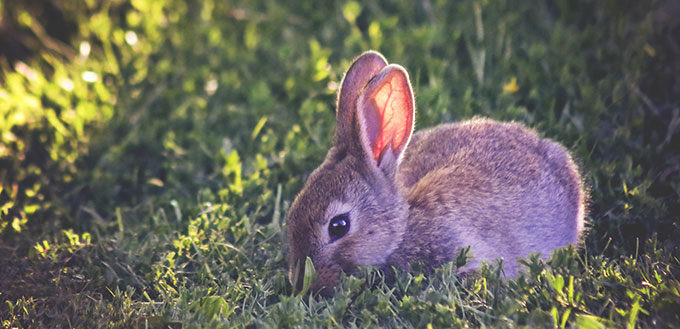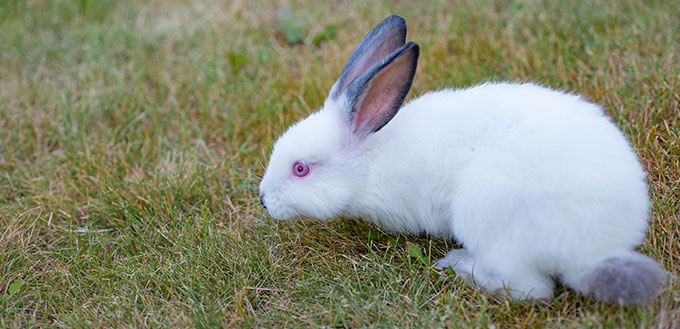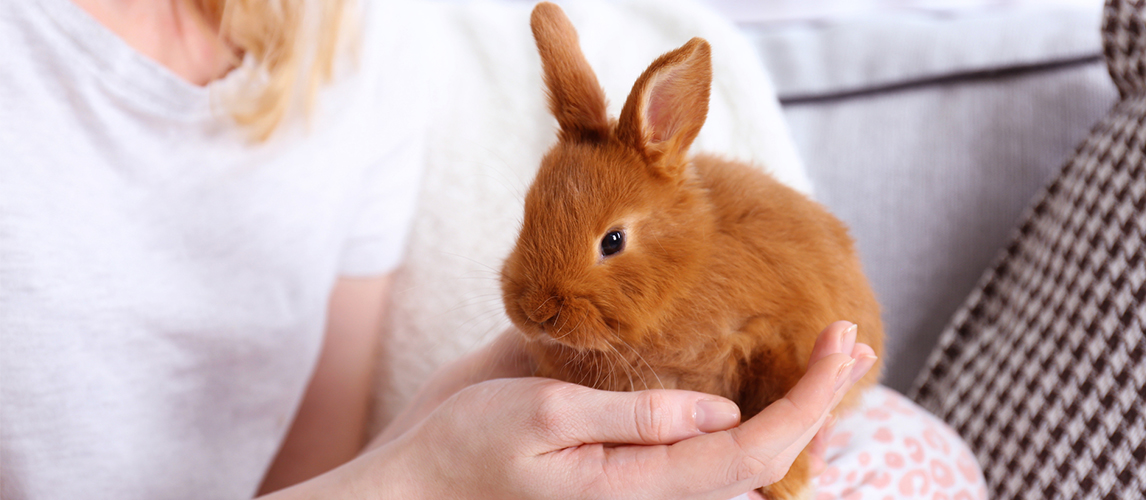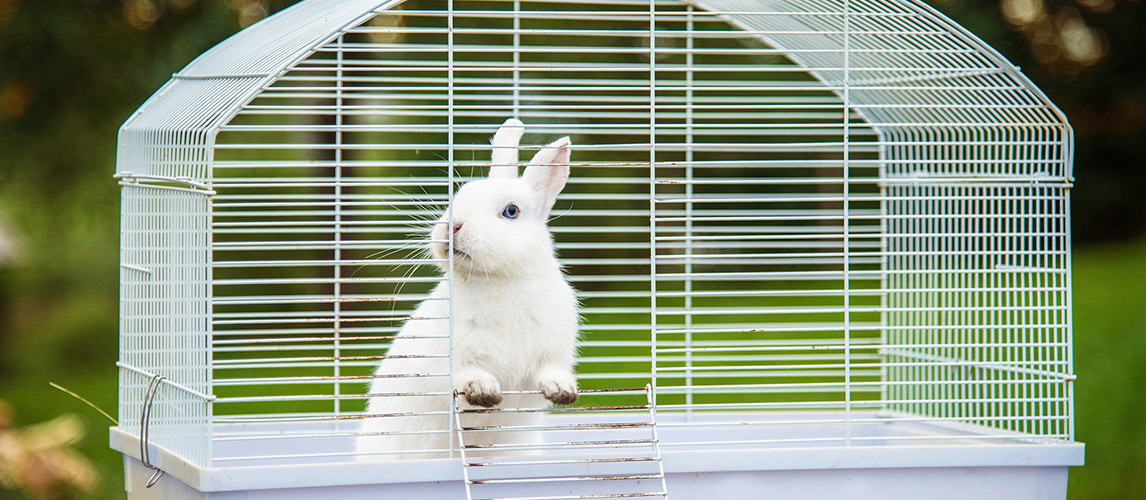Feeding your pets can be surprisingly complicated. Many animals have a stereotypical food that they eat, often in cartoons and other media, but, unsurprisingly, cartoons aren’t the best source of information. If you were to believe these common stereotypes you might believe that lizards only eat insects, fish only eat fish flakes, and rabbits only eat carrots.
This isn’t true, and, most importantly, animals need variety in order to thrive. Unfortunately, you can’t just feed your pets any old leftovers, so you have to research anything you want to give your pets. This brings us to rabbits and bananas – how much banana is healthy for your bunny, or is it just a completely bad idea? Are they a great food, a treat, or dangerous? Let’s find out!

Rabbit Diets
Rabbits are well-known as one of the cutest and sweetest little companions you could hope for. If you don’t agree, trying watching them as they eat; there are plenty of videos online you can find if you don’t have a bunny of your own. Their cute little noses twitching as they nibble on their food will just melt your heart. But what should you be feeding a rabbit?
While animals do need variety in order to gain all the nutrients they need, they often have a base food that you can build their diet around. For rabbits, this is hay. This is because rabbits need a high-fiber diet, and if you think about it, this makes sense because they mostly nibble on grass in the wild. Pellets are not a terrible idea, but some veterinarians do not advise a pellet-based diet because they can be too rich for your rabbit.
As you may already know, rabbits are herbivores. This means they do not eat any animal products. However, this does mean they can also eat some fruits and vegetables alongside their grass and rabbit hay. Green and leafy vegetables are best, which could include:
- Arugula lettuce
- Broccoli
- Basil
- Bok Choy
- Butter lettuce
- Boston lettuce
- Cilantro
- Clover
- Dandelion Greens
- Mint
- Mustard Greens
- OkraLeaves
- Parsley
- Pea pods
- Romaine lettuce
- Watercress
- Wheat grass
Not all salads, vegetables and leafy greens are good for rabbits, however. Iceberg lettuce, for example, is surprisingly not nutritious and should not be given to your rabbit. Kale, turnip greens and collard greens are all too high in calcium to be fed to your rabbit more than twice a week, and, most ironically, carrots should also not be relied upon.
Carrots are a very sweet vegetable that is comparable to fruit. The high sugar content in fruits and certain vegetables, such as carrots, mean that they should only be given to your rabbit as a treat up to twice a week. Besides carrots, other treats that you could feed your rabbit include:
- Apple
- Blackberries
- Blueberries
- Melon
- Papaya
- Peach
- Pineapple
- Plum
- Pears
- Raspberries
- Strawberries
Last of all, grains can be digested by rabbits, but will be quite fattening and should also only be used as treats. Occasionally, an underweight rabbit may be prescribed oats to help them put on weight, but overfeeding rabbits and obesity is, currently, a much more common health concern with pet rabbits, so oats should be mostly avoided.
Rabbits and Bananas
The short, but unhelpful, answer to the question ‘Can my rabbit eat banana?’ is yes. Rabbits can digest, and will enjoy, bananas as a fruit. Their enthusiasm may even encourage you to add it as a regular part of their daily diet. While this is sweet, you should act very cautiously. As we’ve already suggested, obesity is an all-too-common health problem in captive rabbits. There are a few reasons for this:
- Some pet owners are not necessarily aware of the limitations they should place on fruit, carrots, grains and other fattening food products.
- Rabbits can be quite greedy animals, making it difficult to tell when you are overfeeding them.
- Wild rabbits are often seen eating quite a lot of fruit, but this is because they tend to live much more active lives than captive rabbits.
- It can be difficult to tell if a rabbit is overweight because they are naturally quite round and pudgy animals. Females, in particular, have a storage of fat under their chins, known as the dewlap, that is natural and necessary.
If you are concerned that you have an overweight rabbit, you should feel for their spines. While, of course, you should not be able to see the spine of a healthy rabbit, you should still be able to feel it. Obese rabbits will also have folds of fat around their genitals that otherwise shouldn’t have, and may be struggling to groom themselves, particularly their rear end.
If you are concerned that your rabbit may have an unhealthy weight, you must take them to your veterinarian. You are risking a multitude of health problems that can come from obesity, such as arthritis, ulcers, heart problems and more.

How Often Should My Rabbit Eat Banana?
Rather than asking whether your rabbit can eat bananas, a better question is to ask whether your rabbit should be eating bananas. If you have been feeding your rabbit a diet rich in fruit, you should consider seeking help to adjust their diet to something more healthy.
As part of this diet, it is advised that you give your rabbit a treat only every two days. Portion sizing is also an important part of offering your rabbit a treat. A general guide of what constitutes a treat is to measure out 1 tablespoon of fruit for every 5 pounds that your rabbit weighs, so:
- A 2 pound rabbit gets about 1 teaspoon
- A 3 pound rabbit gets half a tablespoon
- A 5 pound rabbit gets 1 tablespoon
- A 6 pound rabbit gets 1.2 tablespoons
- A 7 pound rabbit gets 1.4 tablespoons
These are just rough estimates, so it is best to check with a veterinarian to ensure you are giving your rabbit the right proportion of food. Another rule that pet owners like to stick to is to never let their treats become more than 10% of their permitted calorie intake. Stick to both rules and you shouldn’t go too far wrong.
Ultimately, bananas, like all fruit, are special treats to be given to your rabbit sparingly. Although they might really like sweet things, it is not healthy for rabbits to eat a lot of sugar, so create a treat schedule if you want to continue to offer them bananas on a regular basis.
Sources:
- Laurie Hess, DVM, Feeding Your Rabbit, VCA Hospitals
- Rabbit Diet: What to Feed a Bunny, Best Friends Animal Society







